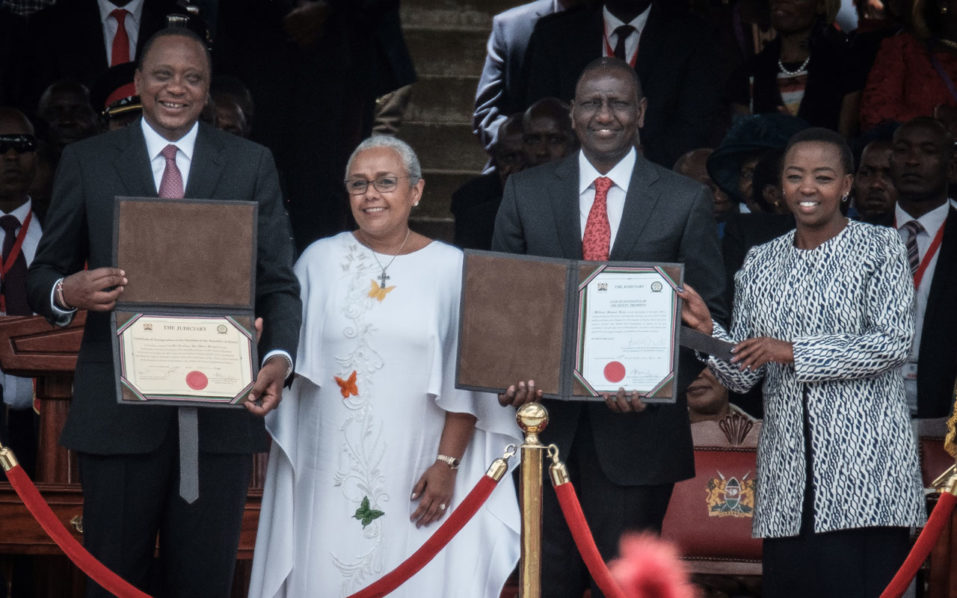
Kenyan President Uhuru Kenyatta was sworn in Tuesday for a second term, but his vow to heal the country’s divisions was overshadowed by violent protests and a pledge from his rival to stage his own inauguration.
Kenya’s schisms after a gruelling election period were on full display on the very first day of Kenyatta’s second five-year term.
The pomp of his inauguration ceremony contrasted with clouds of teargas fired at opposition leader Raila Odinga and his supporters as they attempted to rally elsewhere in Nairobi. At least one person died in the clashes.
Throwing down the gauntlet, Odinga rejected Kenyatta’s inauguration and vowed to hold his own swearing-in on December 12, the day the country marks its independence from Britain.
“I will be sworn in because I am the legitimate president,” he said.
Odinga’s supporters engaged in running battles with police all morning as they attempted to gather for a “memorial rally” to honour more than 50 people killed, mostly by police, in over four months of political upheaval.
“We have one fatality … and we are told four others have been injured and taken to hospital,” a senior police officer told AFP.
Odinga spoke to a crowd of hundreds from atop his car briefly before police lobbed teargas at the convoy, forcing them to disperse.
Meanwhile at the 60,000-seat Kasarani stadium, military parades, a 21-gun salute, traditional dancing and drumming accompanied Kenyatta’s vows to heal the wounded nation.
“I will devote my time and energy to build bridges, to unite and bring prosperity,” he said as he started his second term faced with a large portion of the population that rejects his election outright.
Kenyatta urged the nation to focus on building the economy rather than dwell on divisive politics.
“No one eats politics. For the last 50 years, we have watched as the Asian economies have risen to wealth, while much of Africa has stagnated. The difference is that they used politics to create vibrant economies for their people,” he said.
“In our case, we have pursued politics as an end in itself, rather than as a means to economic prosperity. This must end.”
Kenyatta and his deputy William Ruto took the oaths of office in front of several African heads of state, including from South Sudan, Uganda, Rwanda, Zambia, Somalia, Gabon, Botswana and Ethiopia.
Prime ministers, foreign ministers and special envoys represented other African nations, as well as Qatar, Serbia, Ukraine and the United Arab Emirates.
Israeli Prime Minister Benjamin Netanyahu, while placed on top of the Kenyan government’s guest list, did not attend the ceremony, but had a number of meetings with African leaders scheduled during his visit.
The swearing-in ceremony also got a large dose of teargas as crowds tried to force their way into the packed stadium, with police on horseback struggling to keep them under control.
– ‘Despotic coronation’ –
The inauguration came after the Supreme Court validated Kenyatta’s victory in last month’s rerun poll.
But analysts say the swearing-in may not draw a line under the country’s political crisis, given Odinga’s vow to fight on.
The NASA coalition has described the inauguration as a “despotic coronation”.
The electoral strife goes back to an August 8 poll that was annulled in September by the Supreme Court, citing “irregularities and illegalities”.
The court ordered a rerun in October that was boycotted by the opposition, handing Kenyatta a landslide of 98 percent of votes cast by just 39 percent of the electorate.
The disputed election season has split the country along ethnic and regional lines.
However, political violence has not reached the scale of the bloody aftermath of elections in 2007, when 1,100 were killed.
Odinga, 72, finds himself denied the presidency for the fourth and likely last time in his long career.
He has vowed to found a “third republic” — following independence from Britain in 1963 and a new constitution adopted in 2010 — and pursue protests and economic boycotts aimed at undermining Kenyatta’s “dictatorship”.
The current crisis draws on a deep well of social, ethnic and geographic grievances in the country of 48 million people.
In areas loyal to Odinga, an ethnic Luo, there is a sense of having been ground down and discriminated against since independence, not least by Kenyatta’s Kikuyu group, which has given Kenya three of its four presidents.
Months of disruption and unrest, plus the holding of two separate elections, have badly affected the economy, hitting the poorest hardest while leaving the wealthy political elites relatively unharmed.
Kenyatta vowed in his speech to provide 100-percent universal healthcare coverage and create jobs by focusing on the manufacturing sector.
[ad unit=2]



